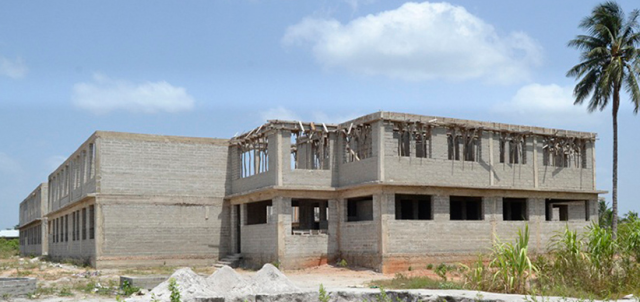BTN.com staff, December 31, 2015
It?s easy to take something as fundamental as clean water for granted. Whether we need it to stay hydrated, cook a meal or bathe, access to suitable water is rarely a problem for those who live in the United States.
Other areas of the world aren?t as fortunate, and that creates all kinds of problems in areas ranging from public health to education. That?s why a group of Michigan State students is taking up the challenge of building of a rainwater containment system at a new school in Tanzania.
Located in Buyuni, the school will be home to approximately 400 elementary students. In building the rainwater containment system, MSU?s Engineers Without Borders chapter will team up with the Salvatorian Sisters of Tanzania, who will construct and operate the school.

?Providing safe and affordable drinking water and reducing the demand on the local water well are definitely the main goals of this part of the project,? said Stephanie Fierens, an environmental engineering major and president of the MSU chapter of Engineers Without Borders (EWB-MSU).
The student organization found the school after the group spent years searching for new projects. That included reaching out to various contacts in their local community. One of the causes they discovered was Solar Circle, a non-profit organization in Lansing, Mich., that was doing some work in Tanzania.
?They have a connection with the community, particularly in Buyuni, and they?ve been working to build a school there,? Fierens explained. ?When our EWB chapter met with them, we talked about ways that we could help, and that?s how the idea of a rainwater collection system came about.?
The project got a significant boost when it was awarded a $25,000 grant from the 2015 Ford College Community Challenge.
?Getting the grant provides us with enough money to implement the first stage of our project, which is building the rainwater storage and filtration system for the school,? said Sarah Parsons, vice president of EWB-MSU and a mechanical engineering major.
Parsons is among a group of four EWB-MSU students and two professional mentors who just departed for Tanzania on a nearly two-week assessment trip.
?During that trip, nothing is built,? Fierens said. ?We just go to the site and we assess elevation and what will be necessary to build. We also get to know the community and learn if there are cultural norms we need to abide by. Once we return, we will start to design.?
?The assessment trip is to build trust with the community,? Parsons added. ?It allows us to go down there with a few different designs in mind. Nothing is set in stone, however, until that trip is done. The travel team gets to evaluate everything and help determine how to proceed.?
A larger group will then return in the summer to construct the system and finish the project. While only a select few will make the initial trip, Parsons said roughly 10 students will meet weekly to discuss the designs and various elements of the project. Additional opportunities for others to travel will almost certainly arise.
As Parsons and others prepared for the site assessment, they also spent significant time learning about life in Tanzania.
[btn-post-package]?Our connection to the Solar Circle helps, as they?ve been in contact with that community for over 15 years,? she said. ?We?re also working with others in the College of Engineering and the university in general who are familiar with the area, including the African Studies office. We?ve been reaching all across campus to learn as much we can about Tanzania, its culture and how we can make an impact.?
While Fierens, Parsons and the other students involved with the project look forward to helping an African community in need, the opportunity to experience what their engineering skills can do when applied in the real world isn?t lost on them.
?Right now, we?re in the engineering building working towards a goal,? Fierens said. ?But it?s cool to travel and actually be in the community that you?re helping. You can see your impact being made and what you can do as an individual. In addition, you get close to those you travel with, not just the students but also the professionals. It forms a great connection with people who could be lifelong mentors throughout your career.?
?It?s definitely a very unique experience,? Parsons added. ?A lot of times you aren?t able to apply your engineering knowledge to the real world until after you?ve graduated. Getting this experience early on is awesome, and it will help a lot. We?ve got everyone from freshmen to seniors working on this projects. We?re all benefiting.?
By Adam Fluck







